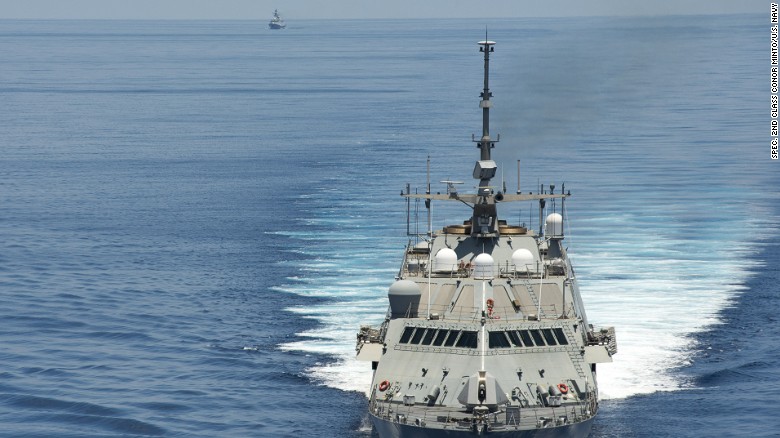After repeated and unheeded warnings to China to halt its massive reclamation works in the South China Sea, the U.S. is contemplating an option fraught with danger: limited, but direct, military action.
 |
| The littoral combat ship USS Fort Worth conducts patrols in international waters near the Spratly Islands as the Chinese guided-missile frigate Yancheng trails close behind. |
By sending U.S. warplanes over artificial islands that China is building, and sailing naval vessels close by—an option now under consideration, according to U.S. officials in Washington—America could end up being sucked more deeply into an increasingly heated territorial dispute between China and its neighbors, say regional security experts.
If such action fails to deter China, America will face a hard choice: back down and damage its credibility with friends and allies in the region, or escalate with the risk of being drawn into open conflict with China.
China immediately suggested that America would be crossing a line if it goes ahead with the plan. “Do you think we would support that move?” asked Foreign Ministry spokeswoman Hua Chunying. “Freedom of navigation definitely does not mean the military vessel or aircraft of a foreign country can willfully enter the territorial waters or airspace of another country.”
 |
| CLICK MAP to ENLARGE |
Her comments reinforced a view that America and China may be on a collision course. There’s very little prospect that China will stop ballooning the specks of territory it controls in the Spratly Islands. Much of the work has already been completed, but there is still more to do.
“China will not stop activities on what it believes to be its own territory and within its sovereign rights,” asserts M. Taylor Fravel, an associate professor of political science at the Massachusetts Institute of Technology.
That being the case, says Mr. Fravel, “greater pressure could form for the United States to do even more and become even more involved.”
 |
| In a photo released by the Vietnamese Coast Guard in May last year, a Chinese coast guard vessel, right, fires water cannon at a Vietnamese vessel near a Chinese oil rig. Photo: AP |
China has cleverly exploited this dilemma in the past. Last May, after U.S. President Barack Obama sought to reassure U.S. allies on a visit to the region, China dragged a gigantic oil-drilling rig into disputed waters off Vietnam. Its apparent intention was partly to expose the hollowness of American security guarantees.
Indeed, China’s military strategy in the region has been built around developing the means—missiles, ships, warplanes, antisatellite weapons and cybercapabilities—to deter America from intervening in any crisis by dramatically raising the potential costs.Read the rest of the story HERE and view a related video below:
If you like what you see, please "Like" us on Facebook either here or here. Please follow us on Twitter here.



No comments:
Post a Comment